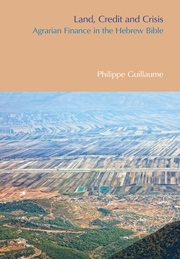Book contents
- Frontmatter
- Contents
- Illustrations
- Acknowledgements
- Introduction
- Part I Land
- 1 Land Tenure
- 2 Communal Land
- 3 The Myth of the Helpless Peasant
- 4 New Perspectives on Land Passages
- Part II Credit
- Part III No Crisis in Yehud
- General Conclusion
- Glossary
- Bibliography
- Index of Biblical References
- Index of Authors
- Index of Subjects
3 - The Myth of the Helpless Peasant
from Part I - Land
- Frontmatter
- Contents
- Illustrations
- Acknowledgements
- Introduction
- Part I Land
- 1 Land Tenure
- 2 Communal Land
- 3 The Myth of the Helpless Peasant
- 4 New Perspectives on Land Passages
- Part II Credit
- Part III No Crisis in Yehud
- General Conclusion
- Glossary
- Bibliography
- Index of Biblical References
- Index of Authors
- Index of Subjects
Summary
Peasant helplessness is a recurring cliché in biblical exegesis. Ancient farmers are regularly depicted as the hapless victims of state taxation, conscription, natural disasters and greedy moneylenders. For instance, Fred Gottheil (1986) and Gabriel Baer (1983) quote catastrophic reports from Western observers who exaggerated or misunderstood the evidence. Exegetical literature is full of broad depictions of biblical farmers losing their land, their families and their freedom, as suggested by readings of Nehemiah 5 (§7.2).
The same notion is found in studies of the ancient Levant. In an impressive synthesis of Mesopotamian land regimes before the turn of the era, Johannes Renger (1995: 308) explains the rise of large manorial estates held by grandees of the Neo-Assyrian empire as ‘Of course the result of the gradual impoverishment of small landowners or landholders’. The huge temple estates are also understood as the result of the enslavement of impoverished persons who became oblates or bondsmen of the temple. ‘They had lost their personal freedom short of becoming slaves in the narrow sense’ (Renger 1995: 312). As these oblates were not able to plough all the temple estates, land was leased to agricultural entrepreneurs who contracted landless individuals to do the job (Renger 1995: 313).
The template of the ‘the gradual impoverishment of the lower echelons of society’ functions particularly well whenever a concentration of wealth is identified (Renger 1995: 319). As the theory goes, any accumulation of wealth must result from the deprivation of others. Yet, the question of how the rich can get richer by fleecing the poor remains.
- Type
- Chapter
- Information
- Land, Credit and CrisisAgrarian Finance in the Hebrew Bible, pp. 56 - 66Publisher: Acumen PublishingPrint publication year: 2012



